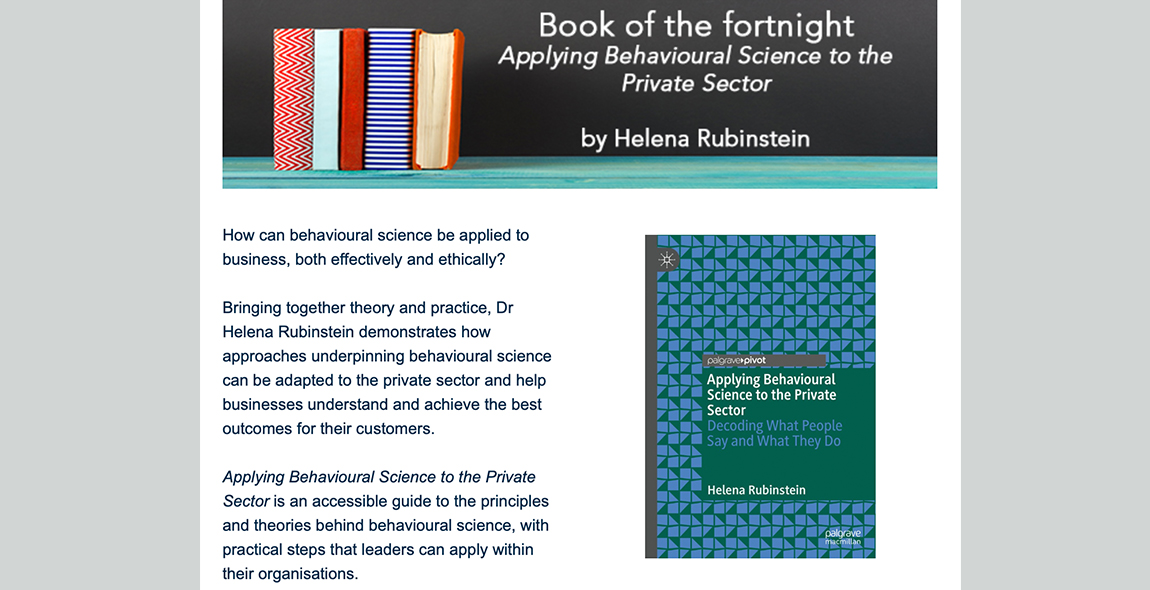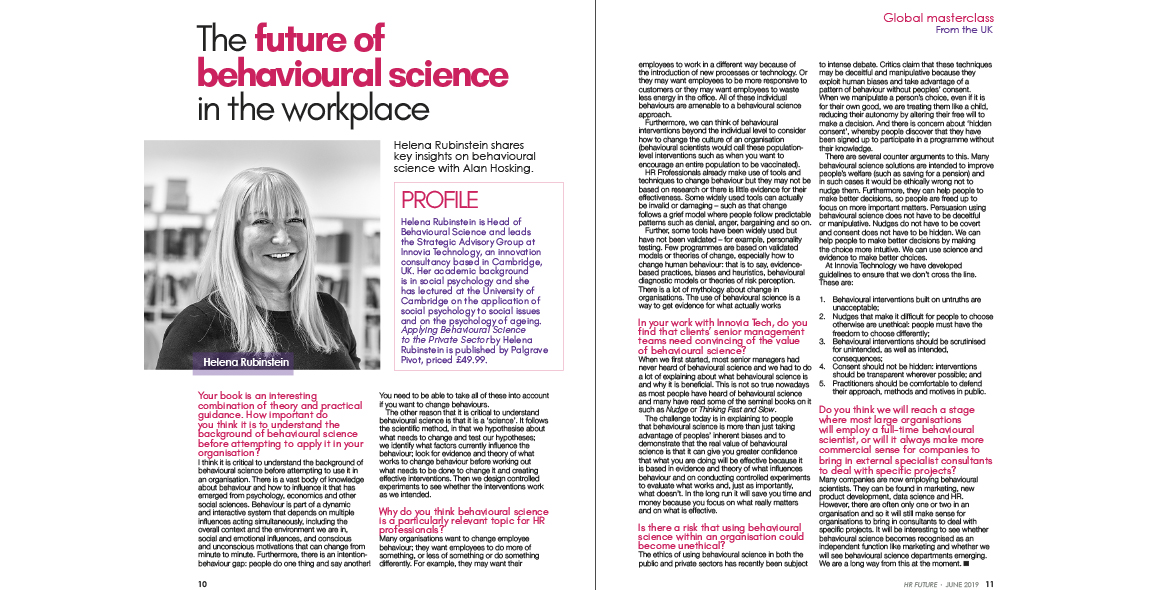Deep Read:
A unique behaviour change programme
‘When you drive, never drink’ campaign. Follow the story... ... →
For general enquiries please contact us on
+44 1223 248888
enquiries2024@innoviatech.com
St Andrew's House, St Andrew's Road
Cambridge CB4 1DL United Kingdom
FIND US
In innovation, behavioural science helps to reduce uncertainty...
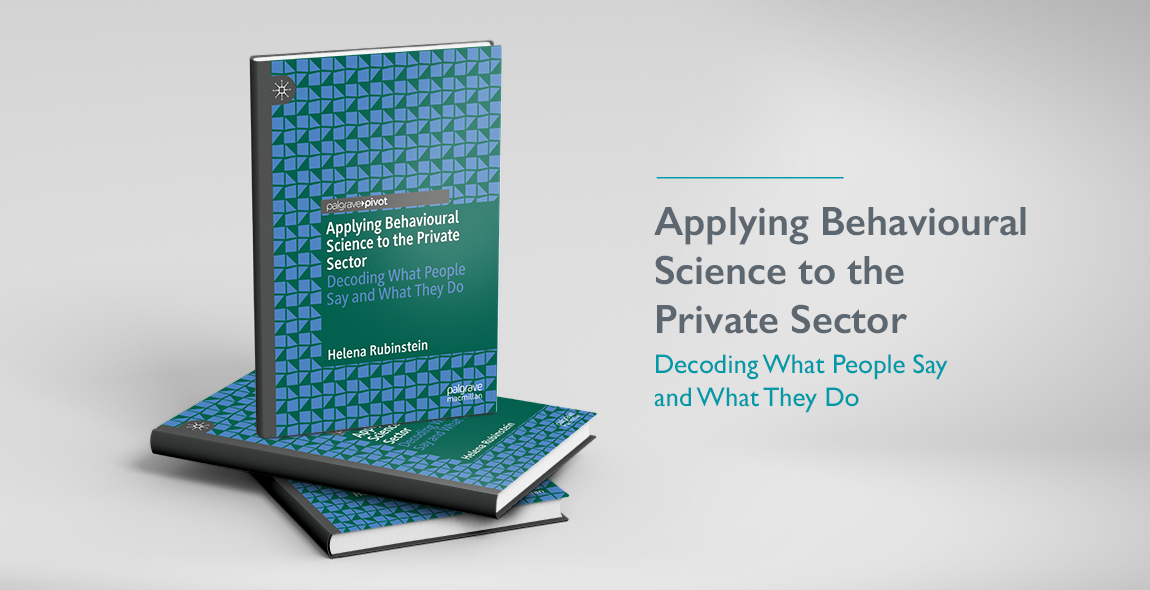

‘Applying behavioural science in the private sector: Decoding what people say and what they do’ (published by Palgrave MacMillan in December 2018) was written by Innovia’s head of behavioural science, Dr Helena Rubinstein. The idea for the book came from a discussion with a client who said that he thought that his company would benefit from using behavioural science but that he didn’t “know enough about it or how to find someone who is really good at it”. This book is the result: it is designed to help managers know when and how to use behavioural science in their business, and how to get the most out of it for innovation, marketing and internal behaviour change. At Innovia, behavioural science is an integral part in many of our projects because it helps businesses to understand their customers and to achieve the best outcomes for them. We have an established process for applying theory and models of behaviour to a range of different situations. Our team of behavioural scientists has experience in many different industries, with backgrounds in social and health psychology, experimental psychology, public health, neuroscience, and behavioural economics.
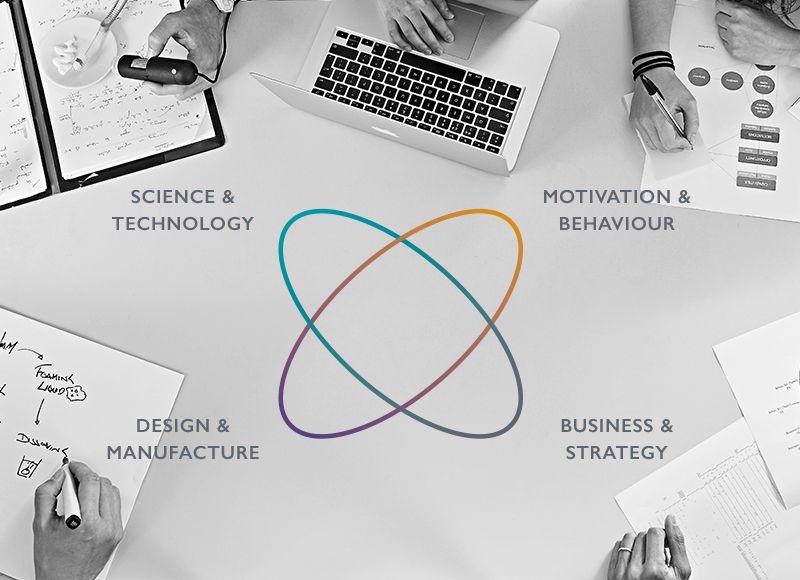
In innovation, behavioural science helps to reduce uncertainty. Innovation is inherently uncertain – in a new product, for example, there are uncertainties around the technical feasibility, the business case, but also around the consumer proposition and use. Using behavioural science makes the innovation process more efficient, but it needs to address the right questions. This is why it’s best applied as part of a multidisciplinary approach, which rapidly resolves many different innovation questions to generate well-rounded, actionable solutions. We’ve successfully used behavioural science to address many different challenges in many different industries: helping passengers to feel more relaxed in airports, changing people’s shaving behaviour, and even supporting smokers to successfully quit.
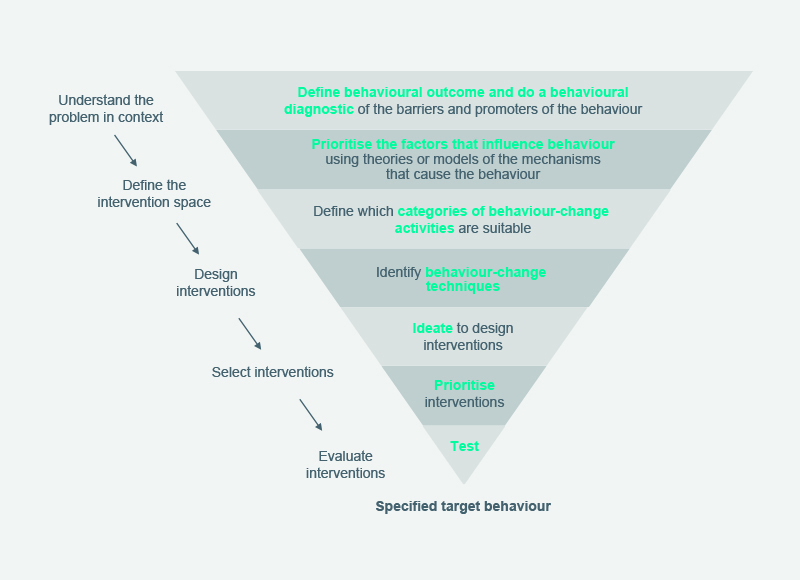
People believe that they understand human behaviour because they are human, but it’s actually almost impossible to intuitively know how people will behave. People say one thing and do another. It is hard to predict human behaviour and even harder to change it, but behavioural science helps us to be better at understanding why people don’t always do what they say they do.
Behavioural science is a ‘hot topic’ and many individuals and organisations are exploring how to use it. However, some approaches fail to consider the underlying principles or theory, use just one model of behaviour, or lack a systematic process that yields effective behaviour-change solutions. At Innovia, we believe that human behaviour is too complex to be explored in this way. Instead, we use a rigorous, and structured approach (see left) that makes use of the theory and evidence of what is effective and applies a variety of validated models. We are solution neutral – seeking the best approach to meet your unique challenge. We believe that this approach is essential to give confidence in the solutions that we generate. And our clients agree.
Unethical manipulation? How to use behavioural science for good
Behavioural science is the ‘new, new’ thing. Almost every day we hear that a business is using it to create more impactful communications, to improve product and service design, or to change employee behaviours. The attraction lies in the ‘science’: behavioural science appears to take the guesswork out of influencing people by applying the scientific method and providing evidence for what really drives human behaviour. read more
Customer experience about to take a different shape
Just five years ago, very few companies had heard of behavioural science and even fewer companies were making use of it, said Helena Rubinstein, a behavioural scientist at Innovia Technology and author of new book, Applying Behavioural Science to the Private Sector. “Today, more and more companies are taking advantage of the science of human behaviour and this trend shows no sign of slowing,” Rubinstein explained. read more
How to make your business innovate like a disruptive start-up
Helena Rubinstein, Behavioural Scientist at Innovia Technology and author of new book, Applying Behavioural Science to the Private Sector (Palgrave Macmillan) believes that “one of the reasons that start-ups disrupt is that they tackle a big problem that really needs to be solved. Many of the solutions are based on an understanding of what really motivates customers and what turns them off.” read more
How Southwest Airlines used behavioural science to create a better boarding experience
Have you ever watched people waiting at the boarding gate to get on a plane? After much delay passengers arrive at their point of departure having gone through check-in, waited at security and navigated their way through the airport. They are really keen to get going but then comes another problem – the dreaded waiting in line to board the aircraft. read more
Applying behavioural science to the private sector decoding what people say and what they do, reviewed
By @SimonCocking review of Applying Behavioural Science to the Private Sector Decoding What People Say and What They Do, by Helena Rubinstein. This book demonstrates how applying behavioural science to commercial problems can effectively help businesses to understand and achieve the best outcomes for their customers. Bringing together theory and practice the author describes how approaches underpinning behavioural science can be adapted to the fast-moving environment of the private sector. read more
Behavioural science and how to develop tech products people really want
Developing tech products that people really want is hard. Even the biggest companies have major fails. Remember Microsoft Zune in 2001, Google Lively in 2008 or the Windows Phone in 2010. Probably not. They are among the 40–50% of failures of new products we see every year – little better than chance.read more
Applying behavioural science to the private sector is book of the fortnight in the MBA Association which is global and is now part of their book club read more
Nudging: what HR professionals should understand about behavioural science
Getting people to change their behaviour or make certain choices requires a ‘nudge’ – but how can HR teams make sure that they are not only nudging effectively, but ethically too? read more
Mining Behavioral Science for Concrete Results
Seemingly everyone is talking about behavioral science. Businesses are using it to improve marketing communications; design better products, services, and experiences; and change behaviours in organizations. read more
How Southwest Airlines used behavioural science to improve queuing times
Southwest Airlines is the inspiration for most of the low-cost airlines around the world, having been a beacon of success in an industry that is highly cyclical and not known for sustaining profitability. It has done so by combining high levels of efficiency with a hard-earned reputation for friendly service. read more
